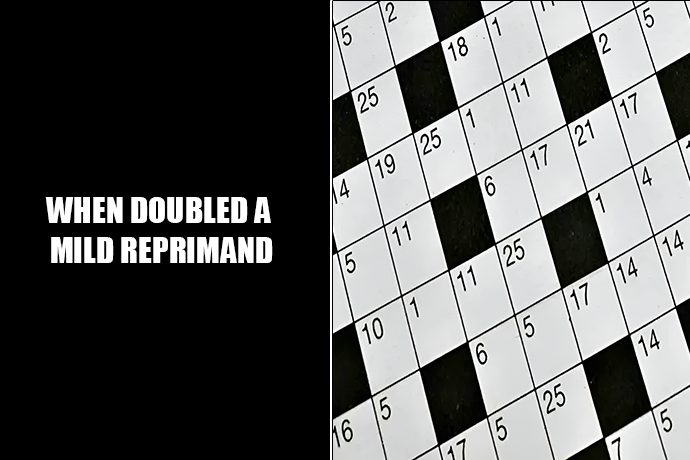Introduction to When Doubled a Mild Reprimand
In the vast world of expressions and phrases, some stand out not for their complexity but for their peculiar charm. One such phrase is When Doubled a Mild Reprimand It rolls off the tongue in an intriguing way, hinting at deeper meanings beneath its surface. Have you ever wondered about what it really signifies? Why do certain words hold power over our emotions and perceptions? This exploration promises to unravel that mystery while diving into its origins, cultural significance, and even psychological impact. Join us as we dissect this unique phrase and discover how it shapes interactions in both subtle and profound ways.
Table of Contents
Defining the phrase
The phrase When Doubled a Mild Reprimand captures a unique blend of nuance and restraint. At its core, it suggests that criticism or correction can be delivered in a gentle manner. The use of the word “mild” indicates that the reprimand is not harsh or punitive.
The imagery evoked by When Doubled a Mild Reprimand adds an intriguing layer. It implies that this mild rebuke often arises from repetition or emphasis on behavior—like addressing someone twice for their oversight. This duality softens the blow while still conveying necessary feedback.
This phrase embodies an approach to communication where intention aligns with compassion. It reminds us that even when pointing out faults, we have the power to choose our words carefully and maintain respect in dialogue.
Origins and history of the phrase
The phrase When Doubled a Mild Reprimand has roots that can be traced back to various linguistic traditions. Its essence lies in the interplay between language and social dynamics. From early literature to contemporary dialogues, phrases like this have evolved.
Historically, it reflects societal norms around communication. The idea of reprimanding someone lightly suggests an understanding of tone and context. It conveys authority without harshness.
In classic texts, authors often employed similar expressions to navigate complex characters’ relationships. This approach allowed for critique while maintaining camaraderie among peers.
As time progressed, the phrase found its way into modern vernacular through adaptations in pop culture and media. Its use highlights the balance between criticism and encouragement — a tightrope walk many struggle with today.
Common usage and examples in literature and pop culture
The phrase When Doubled a Mild Reprimand often appears in various forms across literature and pop culture. It encapsulates the notion of gentle correction rather than harsh criticism.
In classic novels, characters may use this expression to address a friend’s misstep with humor. This approach softens the blow and maintains camaraderie.
Films frequently illustrate similar dynamics. A mentor character might say it when guiding a younger counterpart, highlighting the importance of growth through constructive feedback.
Even in social media memes, this phrase pops up as users share relatable moments where they’ve faced minor critiques from friends or family. The lightheartedness of these instances invites laughter instead of defensiveness.
Such examples show how versatile this phrase can be, signaling that even reprimands can be delivered tenderly without damaging relationships or self-esteem.
Analysis of the meaning behind the phrase
The phrase When Doubled a Mild Reprimandinvites curiosity. It suggests that reprimands can vary in intensity based on context. Doubling the words signifies emphasis but retains a gentle tone.
There’s an inherent contradiction here. A reprimand traditionally carries negative connotations. Yet, this phrase allows for a softer approach to correction. It implies that feedback is not always harsh but can be constructive and nurturing.
This concept fosters open communication rather than fear of confrontation. When criticism is presented mildly, it encourages receptiveness and growth instead of defensiveness.
In relationships—be they professional or personal—this tactic becomes essential. Balancing honesty with kindness creates safe spaces for dialogue and learning opportunities without damaging rapport or trust.
This duality enhances our understanding of language’s power in shaping interactions and outcomes.
Exploring the psychology and impact of using this phrase as a form of reprimand
The phrase When Doubled a Mild Reprimand carries weight. It evokes a sense of gentle correction rather than harsh criticism. This subtlety can ease tension in conversations.
Psychologically, such phrases serve as a buffer. They allow individuals to express dissatisfaction without igniting defensiveness. The recipient may feel less attacked and more open to discussion.
Using this approach promotes reflection over retaliation. People are encouraged to consider their actions thoughtfully instead of reacting impulsively when confronted with mild reprimands.
Additionally, the impact on relationships is notable. By opting for softer language, trust can be preserved and even strengthened. Constructive dialogue flourishes in an environment where criticism feels manageable.
In workplaces or personal interactions, adopting this method fosters collaboration rather than conflict. It encourages growth while maintaining harmony among peers or loved ones, proving that words have profound effects beyond mere expression.
Alternative ways to communicate criticism effectively
Criticism can sting, but it doesn’t have to. One effective method is the “sandwich” approach. Start with a positive comment, then gently introduce your criticism, and end on another uplifting note. This softens the blow.
Another technique involves using “I” statements instead of “you” statements. For example, saying “I feel overwhelmed when deadlines are missed” creates a personal connection rather than placing blame directly.
Active listening also plays a crucial role in delivering feedback effectively. By truly hearing what the other person has to say before offering your thoughts, you create an open dialogue that fosters understanding.
Framing criticism as an opportunity for growth encourages improvement rather than defensiveness. Instead of simply pointing out flaws, highlight potential pathways for development and success.
These methods emphasize empathy while still addressing areas needing attention.
Understanding the power of words and their impact on others
Words hold immense power. They can uplift, inspire, or crush spirits with a mere utterance. The choice of words shapes our interactions and influences perceptions.
Consider how a simple phrase can change the trajectory of someone’s day. A compliment may spark joy, while criticism might linger in the mind for hours. This duality illustrates just how significant language is in human connection.
Cultural nuances add layers to this dynamic. What feels like constructive feedback to one person could feel harsh to another based on their background or experiences.
The psychological effects are profound too. Positive affirmations can boost confidence, whereas negative remarks often lead to self-doubt and anxiety.
Mindfulness in communication encourages empathy and understanding, fostering healthier relationships both personally and professionally. By choosing words carefully, we wield a tool that has the potential to create harmony or discord within our communities.
Conclusion
When Doubled a Mild Reprimand offers a fascinating glimpse into how we communicate criticism. It captures the essence of delivering feedback in a way that is both gentle and effective. This phrase encapsulates an approach to reprimanding someone without harshness.
Understanding its origins can deepen our appreciation for this expression. Often found in literature and pop culture, it demonstrates that language evolves with context while still retaining core meanings.
The psychology behind using such phrases reveals much about human interactions. The impact of words can create significant emotional responses, whether positive or negative. By choosing our words wisely, we have the power to influence others’ thoughts and feelings positively.
While When Doubled a Mild Reprimand has its place in communication, exploring alternative ways to convey criticism effectively remains crucial. Clear yet kind dialogue fosters understanding and promotes growth.
Every word carries weight—a reminder that when expressing discontent or correction, gentleness often yields better results than severity. Embracing thoughtful communication opens doors to more meaningful connections with those around us.


 Lingionner: Discover the Next Big Thing in Tech Innovation
Lingionner: Discover the Next Big Thing in Tech Innovation  Eporer: Exploring the Rising Digital Platform
Eporer: Exploring the Rising Digital Platform  Ultimate Guide: Who Owns Precision Irrigation and Pump Company?
Ultimate Guide: Who Owns Precision Irrigation and Pump Company?  Tech eTrueSports: Revolutionizing the Future of Sports Technology Innovations
Tech eTrueSports: Revolutionizing the Future of Sports Technology Innovations  Aiyifan: Your Ultimate Platform for Cutting-Edge and Unbiased Tech Reviews
Aiyifan: Your Ultimate Platform for Cutting-Edge and Unbiased Tech Reviews  Vy6ys: Exploring the Latest Trends in Technology and Innovation
Vy6ys: Exploring the Latest Trends in Technology and Innovation